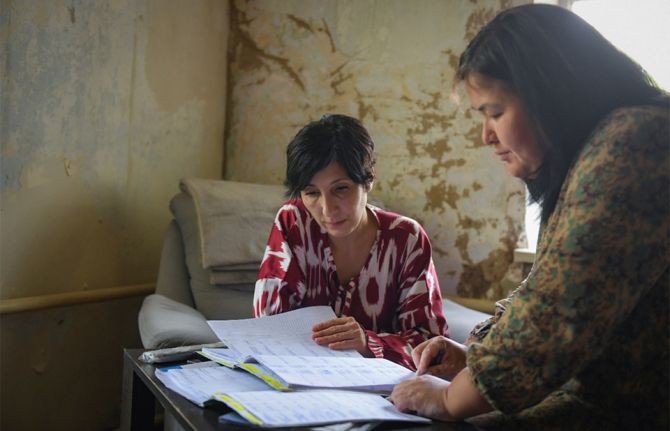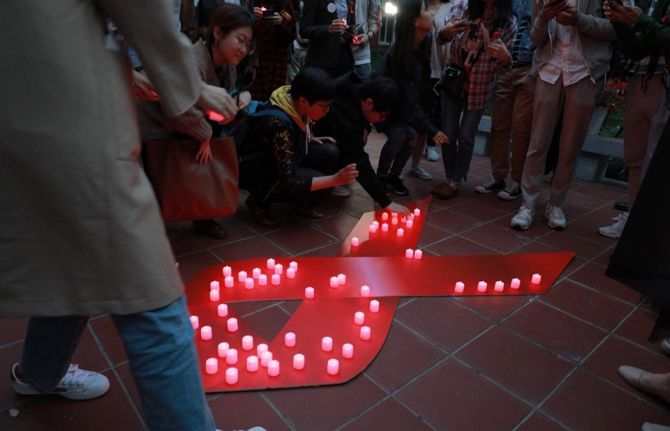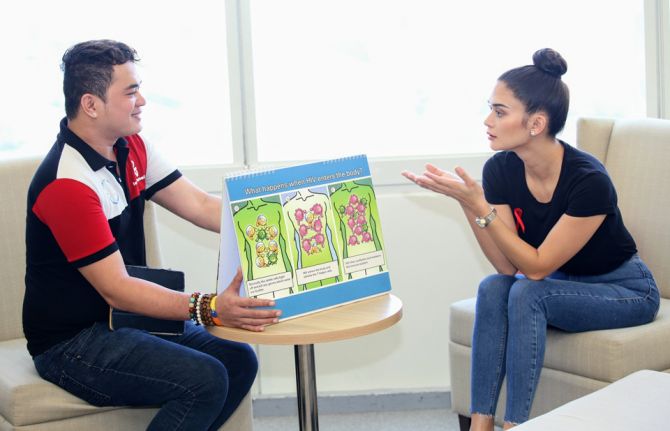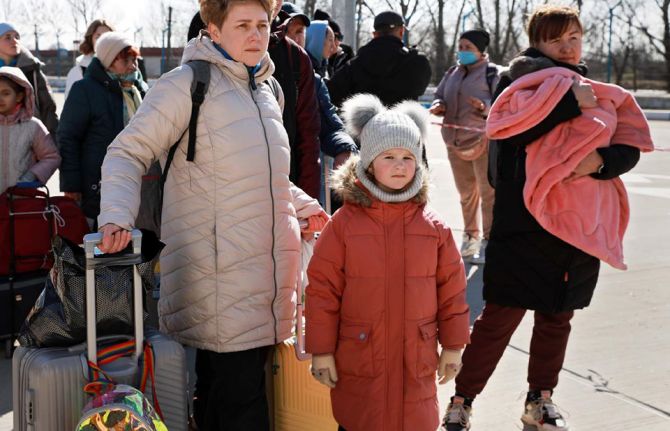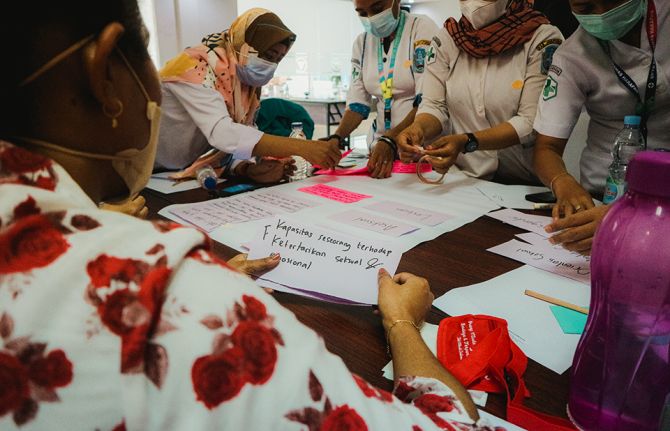
Feature Story
Eurovision stars light candles to dispel discrimination
26 May 2008
26 May 2008 26 May 2008
L to R: Ani Lorak (Ukraine), Diana Gurtskaya
(Georgia) and Deep Zone (Bulgaria).
The opening day of this year’s Eurovision song contest, 18 May, coincided with the 25th International AIDS Candlelight Memorial – a civil society movement for AIDS remembrance, awareness and community action.
To mark the occasion, UNAIDS brought together Eurovision participants in Belgrade to draw attention to the issue of stigma and discrimination against people living with HIV as part of its ‘Stars against AIDS’ project.
The artists chosen to represent Georgia, Bulgaria, Ukraine and Macedonia at this year’s Eurovision joined thousands of people around the world by coming together in solidarity to light candles and remember those who have been affected by AIDS.
“A few years ago I was shocked to learn how pressing the AIDS challenge was in Ukraine,” said Ukranian singer Ani Lorak. “Then I realized that there was no way that I could stay away from the issue and I decided that I had to do everything it takes to help.”
“People living with HIV are just like everyone else. By hugging them and shaking their hands I wanted to demonstrate that AIDS is not transmitted through friendship,” Ani Lorak continued.

The artists attended a press conference to
denounce the challenges that people
living with HIV face in their everyday life.
The artists attended a press conference with the Deputy Ministry of Health of Serbia and Serbian representatives of the Network of People Living with HIV, to denounce the challenges that people living with HIV face in their everyday life.
“I am proud of this project which has brought together a group of talented singers from across Europe,” said Sergei Furgal, Director, a.i. UNAIDS Regional Support Team for Eastern Europe and Central Asia. “Through their music, songs and their strong personal commitment to improving the lives of youth—I know that they will be compelling and eloquent advocates in focusing attention on HIV and making a difference in the AIDS response.”
The Georgian singer Diana Gurtskaya – one of the main catalysts of the ‘Stars against AIDS’ initiative - spoke of her concern about discrimination against people living with HIV.
“We cannot boost the level of tolerance in society unless we change ourselves, “ said Gurtskaya, “ We should do everything it takes to make sure that people living with HIV can enjoy life just like everyone else.”
The Eurovision Song Contest was first held in 1956 and since then it has become hugely popular media event of truly international scope.
Eurovision stars light candles to dispel discrimi
Feature stories:
"Stars against AIDS" in Eastern Europe (19 May 2008)
Multimedia:
‘Stars against AIDS photo gallery
External links:
25th International AIDS Candlelight Memorial
Eurovision Song Contest 2008 Belgrade
Publications:
AIDS epidemic update 2007 - Regional Summaries: Eastern Europe and Central Asia

Feature Story
Strengthening work with MSM in Africa
23 May 2008
23 May 2008 23 May 2008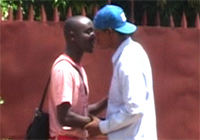
Research in many African countries
indicates higher HIV prevalence among
men who have sex with men and higher
incidence rates from male to male sexual
activity compared to the general
population.
“Like many gay men in Kenya I am married,” said Peter (not his real name) a taxi driver in Nairobi who was busy ferrying partygoers to and from the third party attended by several hundred gay-identifying men and their friends to be held in the Kenyan capital in the last six months.
“We have to hide our sexuality from the rest of society. It’s not like in Europe. But I have a good life, good family, and good friends and really I cannot complain.”
Peter, who has two young children and has always lived in Nairobi, decided to work rather than attend the party held just outside the city centre: “I would have liked to be at the party but we have had fewer visitors to Kenya this year and I need the money. It is fun to be in an environment when you can relax knowing that everyone is the same. There is no way that people can be themselves like that in the bars in town”.
“Sometimes a bar does become popular with a gay crowd but then, a point will come that the bar owner will ask them not to come back because he is afraid of the law and afraid that people might think he is also gay.”
The latest party in the fledgling Nairobi scene was organized on the eve of the International Day against Homophobia. In addition to providing an opportunity for dancing and socializing it also provided space for support groups to distribute HIV prevention information and safer sex packs including condoms and lubricants to a group of men often described by public health officials as ‘hard to reach’.
The following day, the Kenya Human Rights Commission, the International Gay and Lesbian Human Rights Commission and the Gay and Lesbian Community of Kenya booked a half page advertisement in a leading national newspaper promoting the International Day against Homophobia and rights for gay and lesbian people in Kenya.
Despite signs that gay and other men who have sex with men (MSM) are better organized and more visible than ever before in both Kenya and the rest of the continent the words ‘overlooked’ and ‘sidelined’ are currently being used to describe the HIV epidemics that are thriving unchecked among men who have sex with men across sub Saharan Africa.
Research in many African countries indicates higher HIV prevalence among men who have sex with men and higher incidence rates from male to male sexual activity compared to the general population. Furthermore consistently higher levels of infection among men who have sex with men and formidable cultural, social and legal barriers, combined with high levels of stigma and discrimination and the need to address AIDS within the general population, have inhibited the provision of MSM-targeted HIV prevention, care and treatment services.
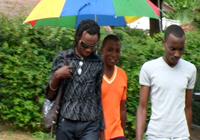
Various African research projects and
initiatives indicate that many men who
have sex with men in Africa also have
female sexual partners and do not
necessarily identify themselves as gay.
In order to address this situation, the Kenya National AIDS Control Council co-hosted a meeting with the Population Council in May 2008 to bring together researchers, advocates and national AIDS programme managers from other African countries to review the status of research and evidence around HIV and men who have sex with men in Africa.
Opening the meeting Professor Miriam Were, Chairperson of the Kenya National AIDS Control Council, recognized the many social and cultural challenges involved in addressing the increased HIV risk of male to male sex and encouraged participants to face facts and develop constructive responses to address HIV among men who have sex with men.
Evidence on HIV prevalence, risk and behavior within groups of men who have sex with men was presented from several studies in Kenya and studies from Namibia, Uganda, Tanzania, Nigeria, Malawi and South Africa.
Meeting organizer and Associate with the Population Council, Scott Geibel, said: “In recent years there has been an increase of research focusing on the HIV needs of African men who have sex with men. The research is helping stimulate an increase in programmatic responses. In Kenya we particularly appreciate that the National AIDS Control Council has considered our research results and allowed it to inform their decision and policy making”.
“Through sharing lessons learned with other African National AIDS Programmes we hope to see an acceleration of targeted HIV responses for men who have sex with men in the region.”
In April 2008, the Open Society Institute in Southern Africa (OSISA), OSI’s Sexual Health and Rights Project (SHARP) and John’s Hopkins Bloomberg School of Public Health, hosted a meeting in Cape Town, South Africa, of organizations working on research and advocacy on HIV prevalence among men who have sex with men in Botswana, Namibia, Malawi and South Africa.
The OSISA/SHARP research partnership was initiated in response to the lack of funding and programmes addressing access to HIV prevention and AIDS treatment services targeting MSM despite overwhelming anecdotal evidence that MSM are a high risk community within the region.
The meeting was intended to evaluate community based studies, managed by national organizations of men who have sex with men, assessing HIV-related risk behaviors and describing the epidemiology of HIV infection among black MSM in urban sites in the four focus countries.

“Stigma and discrimination, even among
AIDS programmers and policy makers,
remains a real barrier to scale-up,” said
Andy Seale, Senior Regional Adviser for
UNAIDS Regional Support Team East
and Southern Africa.
In addition to revealing higher levels of HIV, other key themes emerging from the various African research projects and initiatives indicate that many men who have sex with men in Africa also have female sexual partners and do not necessarily identify themselves as gay.
In all studies, unprotected receptive anal sex was reported as highest risk for HIV transmission. Reported condom use, although often higher than sexually active heterosexuals, was often inconsistent and remains relatively low.
Andy Seale, Senior Regional Adviser for UNAIDS Regional Support Team East and Southern Africa, said: “Despite strengthening evidence that men who have sex with men are disproportionately affected within the generalized and hyper endemic HIV epidemics of Africa there is still poor targeting within national strategic AIDS plans and through programmes and services.
“Stigma and discrimination, even among AIDS programmers and policy makers, remains a real barrier to scale-up.”
Health Development Networks and SAFAIDS (the Southern Africa AIDS Information Dissemination Service) have been hosting an e-forum among AIDS practitioners in Southern Africa entitled ‘Sidelined in Prevention’ to identify barriers to scale-up.
“The discussion so far has been illuminating – during the first few weeks several postings were made anonymously by people fearful of being associated with work focused on men who have sex with men and those who feel unable to engage with the issue on religious and moral grounds,” said Seale.
The e-forum has mobilized a useful exchange between AIDS practitioners and LGBTI organizations (lesbian, gay, bisexual, transgender and intersex) with the sharing of tools, resources, strategies and approaches including to scaling up targeted prevention at a community level.
“Clearly we still have a long way to go – we need to put aside tensions between public health and rights based approaches and any personal issues around morality. All of us in the region working on AIDS should ensure that all people – regardless of their sexual preferences - are able to access the prevention, care and treatment services they need,” said Seale.
Strengthening work with MSM in Africa
Cosponsors:
Feature stories:
Global initiative to stop the spread of HIV among men who have sex with men (24 July 2007)
Focused AIDS programmes in Asia and the Pacific (21 March 2007)
External links:
GALCK coalition of LGBTI (Lesbian, gay, bisexual, transgendered and intersexed people)
GayKenya
International Gay and Lesbian Human Rights Commission (IGLHRC)
Kenya Human Rights Commission (KHCR)
Publications:
Practical guidelines on HIV prevention
Men who have sex with men, HIV prevention and care (pdf, 638 Kb)

Feature Story
New UNAIDS policy on HIV, food security and nutrition
21 May 2008
21 May 2008 21 May 2008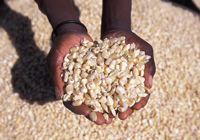
In many parts of the world, lack of food
security and poor nutrition are worsening
the effects of the HIV epidemic.
Photo credit: UNAIDS/M.Jensen
In many parts of the world, lack of food security and poor nutrition are worsening the effects of the HIV epidemic. Food insecurity and poor nutrition can hasten the progression of AIDS related illnesses, while the virus itself reduces the capacity of people living with HIV to work to provide food for themselves and their families.
For this reason UNAIDS, in collaboration the World Food Programme (WFP) and the World Health Organization (WHO), has developed a policy brief on HIV, food security and nutrition. This policy provides guidance for governments, civil society and other partners on how to address food and nutrition concerns in the context of HIV, keeping in mind the commitment made by all UN member states through the Millennium Development Goals both to reduce chronic hunger and halt and reverse the spread of HIV by 2015.
Food Security, Nutrition and HIV vulnerability
Lack of food security constrains people’s choices in employment and education and can lead women, for example, to engage in behaviours which can increase HIV risk such as exchanging sex for food or money. HIV positive mothers also need access to clean water and breast milk substitutes if they are to reduce the likelihood of transmitting HIV to their children.
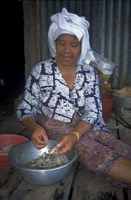
Proper nutrition is critical to
realizing the full benefits of
antiretroviral therapy.
Photo credit:
UNAIDS/L.Alyanak
Treatment
Proper nutrition is critical to realizing the full benefits of antiretroviral therapy (ART). ART itself may increase appetite and it is possible to reduce side effects and thus help people with HIV to stay on treatment if medicines are taken with food. “For two years I have been running HIV and nutrition interventions and have witnessed first hand the positive effect of nutritional counselling and support on patients receiving ART,” claims Dr Praphan Phanuphak, Director of the Thai Red Cross AIDS Research Centre. “Countries (should) set aside a percentage of their ART budget for nutritional interventions, and provide patients with income to buy food for themselves and their families, in the initial phase of treatment, when they may not be strong enough to resume work,”
Impact Mitigation
HIV can reduce capacity to work and earn income for food. It can have particularly devastating consequences where agriculture is the main source of income, leading to decreased food production and hence food insecurity. In rural households coping with HIV, where agriculture is the main employer, ensuring transfer of farming knowledge between generations and instituting measures to improve agricultural productivity will go a long way to ameliorating the impact of HIV.

HIV can reduce capacity to work and earn
income for food.
Photo credit: UNAIDS/M.Jensen
More generally, for households and communities dealing with HIV, “fighting stigma and discrimination will also help people with HIV to find and maintain employment, and thus be able to meet their own nutritional requirements,” notes Dr Phanuphak.
There is a positive association between education and reduction in HIV risk. Better educated children are more likely to absorb prevention information and adopt safer behaviours. Yet households that are not food secure are often forced to take children out of school in order to work to supplement the income lost as a result of their parents’ illness and/or death.
Therefore, UNAIDS, the World Food Programme (WFP) and World Health Organization (WHO) recommend that all actors, including Governments, international agencies and civil society, support effective food security and nutrition interventions, as part of a comprehensive and multisectoral response to HIV.
New UNAIDS policy on HIV, food security and nutri
Cosponsors:
Publications:
UNAIDS Policy Brief – HIV, food security and nutrition (pdf, 244 Kb)
UNAIDS Policy Brief – HIV, food security and nutrition (expanded version) (pdf, 247 Kb)
Related

Feature Story
"Stars against AIDS" in Eastern Europe
19 May 2008
19 May 2008 19 May 2008
Tatiana Lazareva, TV Presenter and one
of the 25 women from Russia and Ukraine
who are participating in the “Stars against
AIDS” campaign.
Photo credit: Serge Golovach
“If in my country I have fans that listen to me, I am ready to endlessly tell them about HIV prevention and how it is wrong to discriminate against people living with HIV,” said Tatiana Lazareva, TV Presenter and one of the 25 women from Russia and Ukraine who are participating in the “Stars against AIDS” campaign organized by UNAIDS.
This is an unprecedented project to tackle stigma and discrimination in the Eastern Europe region. UNAIDS has brought together a group of successful women from Russia and Ukraine to help dispel the taboos and prejudice that often surround AIDS and to reduce discrimination against people living with HIV. Female celebrities from the artistic, media and sports communities have joined their talents and voices to ensure a proactive response to the AIDS epidemic.
Twenty-five famous women agreed to be photographed by the well-known photographer Serge Golovach who offered his services to the campaign for free. Through an exhibition of these portraits, the project aims to raise awareness about AIDS, increase the dissemination of HIV information and to reduce stigma and discrimination towards people living with HIV.
“At first I was reluctant to participate in this project as I hardly knew anything about the scale of the HIV epidemic in my country and had never came across HIV in my daily life,” said actress Dina Korzun. “I thought that closing my eyes to it would be the simplest thing to do. However, I found it was far more important to make an effort and search for information. I then realized that the major challenge of this disease is ignorance, and hence, intolerance,” she added.

Dina Korzun, Actress, Co-founder, Give
Life Charity Fund
Photo credit: Serge Golovach
The exhibition opened on May 15 and can be seen at the Stella Art Foundation in Moscow. The opening was attended by Elena Khanga and Maria Arbatova - two of the celebrities that have participated in the project - along with representatives from the Russian Ministry of Health and Social Development, the UNAIDS Programme Coordinator in Russia and the heads of UN agencies in the country. The exhibition is expected to tour Russia and Ukraine throughout 2008. A selection of the portraits will also be published as a 2009 calendar which will be launch at this year’s World AIDS Day.
Eastern Europe and Central Asia have faced significant increases in the numbers of new HIV infections in recent years. An estimated 150 000 people were newly infected with HIV in 2007 bringing the number of people living with HIV in Eastern Europe and Central Asia to 1.6 million compared to 630 000 in 2001, an increase of 150%. Nearly 90% of newly reported HIV diagnoses in 2006 were from two countries: the Russian Federation (66%) and Ukraine (21%). Furthermore, up to 40% of all new infections throughout the region were women.
“This project is important because it encourages greater public discussion around AIDS. We have seen in many other countries that when there is more public awareness of AIDS, HIV prevention programs work more effectively and there is greater support for people living with HIV. The 25 women who are part of this project are helping make this kind of public discussion possible. We are very grateful for their engagement and support,” said Lisa Carty, UNAIDS Programme Coordinator of the Russian Federation.
"Stars against AIDS" in Eastern Europe
Related
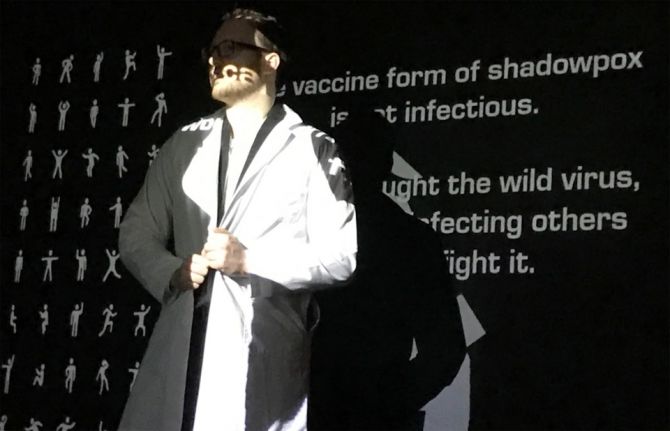 Immune Nations
Immune Nations

23 May 2017

Feature Story
International Day against Homophobia
16 May 2008
16 May 2008 16 May 2008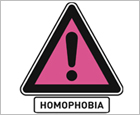
In 1990, the World Health Assembly approved the 10th Edition of the International Classification of Diseases (World Health Organization) on May 17, which established that sexual orientation (heterosexual, bisexual or homosexual), on its own, would no longer “be considered as a disorder”. For this reason May 17 is used to mark the International Day against Homophobia.
Of the 192 member states of the United Nations, 85 have laws that criminalize homosexual behaviour. In some of these countries, conviction can result in the death penalty.
The criminalization of homosexuality fuels discrimination and can force people to hide their sexuality for fear of prosecution. Where people cannot live openly with their sexual orientation, the risk of HIV infection and the impact of AIDS are greatly enhanced as people may be too afraid to access HIV prevention or treatment services. This is compounded where human rights violations on the basis of sexual orientation and gender identity are widespread. These violations include violence, vilification, arbitrary arrests, forced HIV tests, and discrimination.
In many cases—particularly where political or social leaders deny the existence of same sex sexuality or criminalize it—HIV services tailored to their needs are absent altogether from national responses to AIDS.
Infection rates remain disproportionately high among men who have sex with men. “To reduce HIV incidence among this group, as well as protect their human rights, we have to confront, condemn, and eradicate homophobia” said Susan Timberlake UNAIDS Senior Advisor, Human Rights and Law.
UNAIDS works with governments, civil society and the media to fight homophobia and other forms of stigma and discrimination directly and indirectly related to HIV.
International Day against Homophobia
Feature stories:
Anti-homophobia campaign to end discrimination in Latin America (16 May 2009)
Hidden HIV epidemic amongst MSM in Eastern Europe and Central Asia (26 January 2009)
China to tackle HIV indidence amongst MSM (16 January 2009)
HIV prevention hampered by homophobia (13 January 2009)
ICASA 2008: Men who have sex with men and HIV in Africa (07 December 2008)
MSM and the global HIV epidemic (31 July 2008)
Strengthening work with MSM in Africa (23 May 2008)
International Day against Homophobia (16 May 2008)
International Day against Homophobia 2007 (17 May 2007)
Press centre:
AIDS responses failing men who have sex with men and transgender populations (15 May 2009)
Statement by Mr Michel Sidibé, Executive Director of UNAIDS, on occasion of the International Day Against Homophobia, 17 May (15 May 2009)
UNAIDS expresses concern over decision by Burundian National Assembly to criminalize same sex relations (27 April 2009)
UNAIDS welcomes the release of nine men in Senegal imprisoned for their sexual orientation (20 April 2009)
UNAIDS and broad coalition working towards the release of nine men who have sex with men in Senegal who have been convicted and imprisoned (15 January 2009)
Criminalization of sexual behavior and transmission of HIV hampering AIDS responses (27 November 2008)
Multimedia:
![]() UNAIDS delivers a strong message at the 23 TEDDY Award in Berlin
UNAIDS delivers a strong message at the 23 TEDDY Award in Berlin

Feature Story
UNAIDS Executive Director delivers lecture on AIDS response
16 May 2008
16 May 2008 16 May 2008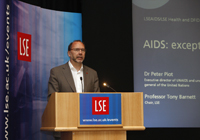
Photo credit: Nigel Stead/LSE
As part of the London School of Economics and Political Science’s (LSE) speakers series on AIDS (LSEAIDS), UNAIDS Executive Director Dr Peter Piot delivered a public lecture titled “The future of AIDS: Exceptionalism Revisited” on May 15.
In his lecture, he reviewed the global response to AIDS to date and considered what is needed in the longer term. He also examined the epidemic within the context of pressing wider health and development issues.
LSEAIDS brings together leading social scientists and experts at the LSE to explore some of the long-term effects of AIDS that risk being overlooked. The group defines the AIDS epidemic as a 'long-wave' event whose full social and economic effects will be with us for decades.
This was Dr Piot’s second LSEAIDS lecture; he first addressed this forum in February 2005.
The event was chaired by Professor Tony Barnett, LSEAIDS and hosted by the LSE, LSE Health and the UK Government’s Department for International Development (DfID).
UNAIDS Executive Director delivers lecture on AID
External links:
Press centre:
Read transcript of the UNAIDS Executive Director's lecture
Speech given at London School of Economics: “Why AIDS is exceptional” by Dr Peter Piot UNAIDS Executive Director (8 February 2005)
Multimedia:
Listen to UNAIDS Executive Director's lecture (15 May 2008) (mp3, 20 Mb)
Related

Feature Story
World Bank lays out new AIDS strategy for 2007-2011
14 May 2008
14 May 2008 14 May 2008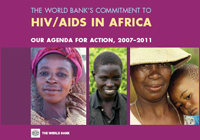
The new publication, The World Bank’s
commitment to HIV/AIDS in Africa: Our
agenda for action, 2007–2011, reports
that AIDS remains the leading cause of
premature death and is a major threat to
development in Africa.
In a new report launched 14 May 2008, the World Bank reaffirms its commitment to a long-term engagement to the AIDS response in Africa.
The new publication, The World Bank’s commitment to HIV/AIDS in Africa: Our agenda for action, 2007–2011, reports that AIDS remains the leading cause of premature death and is a major threat to development in Africa. It also states that the disease has disproportionately hit women and young girls, who need the legal, social, and economic power to protect themselves, access treatment and care, reverse infection, and stem stigmatization.
Agenda for Action is a road map for the next five years to guide the Bank’s staff. It underscores lessons learned to date and identifies actions the World Bank will need to take to ensure it can respond to the demands of member countries and other partners for financial, technical, analytical, and collaborative support
The Bank says it is moving away from its initial ‘emergency response’ role as the world’s principal financier of HIV programmes, towards a new mission with four new strategic objectives. These include: at global level, advising countries on how best to manage the complexity of the international financing they receive; and at local level, helping countries to accelerate implementation and take a long-term sustainable development response to HIV; strengthening the monitoring and evaluation capacity of countries to track the efficiency, effectiveness, and transparency of their AIDS response; and building up stronger health and financial systems.
The World Bank was one of the first organizations to respond to AIDS worldwide. Since 2000, it has provided more than $1.5 billion to more than 30 countries in Sub-Saharan Africa to respond to the epidemic. As one of the ten cosponsors of the Joint United Nations Programme on HIV/AIDS (UNAIDS), it is the lead organization in the areas of strategic planning, governance and financial management.
World Bank lays out new AIDS strategy for 2007-20
Cosponsors:
World Bank’s AIDS work in Africa
Press centre:
Publications:
The World Bank’s commitment to HIV/AIDS in Africa: Our agenda for action, 2007–2011 (pdf, 1.05 Mb)
Related

Feature Story
Making a difference: UNAIDS in Iran
13 May 2008
13 May 2008 13 May 2008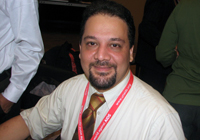
Hamid Reza Setayesh is UNAIDS Country
Coordinator in Iran.
HamidReza Setayesh became the UNAIDS Country Coordinator (UCC) when the UNAIDS Iran office was established in March 2005. Like most UNAIDS Country Coordinators Setayesh’s time is filled with the major task of coordinating the UN response on AIDS in the country. In Iran there are 13 UN offices that make up the Joint UN Team on AIDS, which he chairs. In addition to this, the UNAIDS office also provides technical support to the government and non-governmental organizations (NGOs) as it is considered a trusted and reliable partner.
“Our greatest achievement has been the harmonisation of the UN response to AIDS,” says Setayesh. “We were able to move forward and I am very satisfied with that.” Other important achievements in his three years of office are in the area of improving strategic information, where the country lacks sufficient capability. UNAIDS has assisted the government in designing small studies which provide the evidence for successful interventions.
The major factor which is fuelling the epidemic in Iran is the use of contaminated injecting equipment among injecting drug users, as well as sexual transmission of the disease. Therefore, the work of the Joint UN Team on AIDS is primarily focused on the issue of injecting drug use, “It is our top priority to advocate with the government to allocate resources towards harm reduction interventions,” says Setayesh. According to the United Nations Office on Drugs and Crime (UNODC), there are an estimated 200,000 injecting drug users in the country, considerable proportion of whom are using crystal-base heroin which is known in the market as “crack”.
This work has been successful and the Iranian government has one of the most progressive harm reduction policies on record in a developing country. There are more than 20,000 drug users on the government methadone maintenance programme, which began three years ago. Important legal reforms have facilitated the success of this programme: although drug use is a crime, people who are having treatment for drug use are not considered criminals. “Even needle and syringe programmes can be considered treatment, which is a very big achievement and an important step to de-stigmatise and make services available to people who inject drugs,” says Setayesh. Based on the most recent available studies, more than 90 percent of drug users have used clean needles for their last injection in Tehran.
Two years ago the drug treatment programme was extended to prisons where the United Nations Office on Drugs and Crime (UNODC) is the main partner. “A lot has been done but there is room for improvement,” says Setayesh. “Prison systems are trying to introduce needle exchange and condoms, but it is a challenge to encourage the prisoners to use them. This requires reform to expand services in prisons. “
Nonetheless, Iran is moving from having a concentrated HIV epidemic among injecting drug users to a more generalized situation, mainly affecting partners and wives of people who inject drugs and people formerly in prison. Although the response among these particular key populations has been remarkable and progressive, other groups who engage in risky behaviour such as sex workers and men who have sex with men are not sufficiently addressed in the country's response. Homosexuality is a sensitive issue in Iran and providing services for men who have sex with men presents many challenges for UNAIDS, which is the leading UN programme in this area.
As in many other countries, it is stigma that is the major obstacle to the AIDS response in Iran. “This is found at different levels,” says Setayesh, “although we get a lot of support from communities, from government and partners, it is still a challenge.”
There is also difficulty in getting funding for innovative ideas to challenge stigma. “Though the government is committed, they spend a lot of money on methadone substitution and harm reduction. When you want to work with other groups, the government is less interested and there is no donor support,” says Setayesh. “Radio and television are not that interested in openly addressing stigma, particularly with regard to sexual transmission. They are much better with drugs.”
The Joint UN Team has worked on identifying major sources of stigma and on a novel approach to combat it. They approached high level religious leaders who supported the principle that people living with HIV should not be discriminated against and that public funds should be allocated for their health care. “This helped people living with HIV to express themselves and has put a face to HIV.” In addition, a new strategy, “Positive Prevention” is being developed by National AIDS Programme through supports from UNAIDS and UNDP.
Setayesh is upbeat about the prospects for Iran’s AIDS response. “I think everything is possible in this country,” he says. “It’s very progressive in many aspects, and the government’s work is based on evidence. That provides a very good opportunity for us to convince policy-makers to do more for public health.” With these attitudes Setayesh believes it may be possible to turn the epidemic around. There is already evidence that the methadone substitution programme is having an impact, with decreased prevalence in prisons. “We hope to see results in two years time,” he says. “And that will remarkably affect the community outside because of the linkages between drugs and sex work. So this is a golden opportunity that has already been used and I hope continues.”
Making a difference: UNAIDS in Iran
Feature stories:
Making a difference: Jamaica (14 March 2008)
Making a difference: UNAIDS in Ethiopia (8 February 2008)
Making a difference: UNAIDS in Ukraine (8 January 2008)
Addressing HIV and drug use in the Middle East and North Africa (03 November 2006)
Publications:
Middle East and North Africa Regional Summary 2007 AIDS epidemic update (pdf, 175K)
Related

Feature Story
Leadership and AIDS: Gregg Gonsalves
09 May 2008
09 May 2008 09 May 2008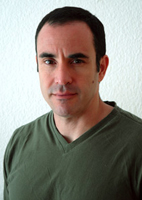
Gregg has been working on
behalf of people living with
HIV since 1990 when he
joined ACT UP in the United
States.
One needs to look no further than to Gregg Gonsalves as an example of leadership in AIDS.
His unswerving commitment to accelerating access to HIV treatment to those most in need and to improving HIV-related human rights, combined with his constant drive for clarity and transparency within the many institutions engaged in AIDS work has no doubt helped improve the lives of many.
Gregg has been working on behalf of people living with HIV since 1990 when he joined ACT UP (AIDS Coalition to Unleash Power) in the United States. In the early nineties, very little was understood about how the virus worked or how the immune system was damaged by it and there were no effective treatments to counter the progress of the disease. Most discussion about AIDS was taking place in the domain of the scientific community.
In search for answers that could bring advances in treatment for people around them dying as a result of AIDS, Gregg and other activists in ACT UP began to attend meetings of AIDS Clinical Trials Group (ACTG) researchers and other scientific fora.
He was drawn into scientific research, in spite of studying studied Russian Language and Literature and English at University, immersing himself in the latest scientific papers and journals in order to be able to have a dialogue with the virologists and basic scientists and pharmacists.
Agents of change
This group of United States based activists was the first to stand up and insist that they have a role to play as people living with HIV and demand the drugs needed to save their lives, the information to know how to use them and how to advocate for them.
Gregg and others determinedly lobbied the scientific community, the pharmaceutical industry and politicians and got results. In many ways today’s global AIDS advocacy movement has some of its roots in the culture that was created by this movement. It spawned the idea of a global public health movement based on the needs of people with the disease.
The AIDS landscape is very different today. Almost two decades later the epidemic has grown and 33 million people across the globe are living with HIV. Progress has been made in developing antiretroviral therapy that can slow down the progression of AIDS. However, access to this treatment, as well as to other prevention and care services, continues to be beyond the reach of many millions of people.
Passionate defender of rights
Today, Gonsalves continues to work to improve people’s access to HIV treatment in Southern Africa, as regional coordinator of AIDS and TB treatment literacy and advocacy programmes for the AIDS and Rights Alliance of Southern Africa (ARASA). In this region alone more than a third of last year’s new HIV infections and AIDS-related deaths occurred. ARASA’s mission is to promote a human rights approach to HIV in Southern Africa through capacity building and advocacy.
“Gregg is a formidable advocate and leader who has brought much-needed energy and passion to AIDS responses in North America, globally and now, in his current position, across Southern Africa,” said Andy Seale, UNAIDS Eastern and Southern Africa Senior Regional Adviser, Advocacy, Communications and Information.
“He and many other leaders like him in civil society have an important role to help ensure that all stakeholders remain alert, increasingly accountable to the people most affected by this epidemic and ready to respond to the many challenges ahead.”
Gregg is also a founding member of the International Treatment Preparedness Coalition, a network of more than 1000 people from 125 countries advocating for universal access to HIV/AIDS and TB treatment.
The John M. Lloyd Foundation recently selected Gregg as the first-ever recipient of the $100,000 John M. Lloyd AIDS Leadership Award. It is a fitting recognition for this AIDS leader.
Leadership and AIDS: Gregg Gonsalves
Feature stories:
Leadership and AIDS: Patricia Pérez (8 April 2008)
External links:
New John M. Lloyd AIDS Leadership Award Recognizes Visionary Advocate (27 March 2008)
AIDS and Rights Alliance of Southern Africa
Related

Feature Story
International Health Partnership launches new web site
07 May 2008
07 May 2008 07 May 2008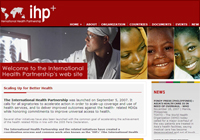
The new International Health Partnership
public web site shares information on
strengthening health systems and services
The International Health Partnership (IHP+) has launched a public web site to facilitate the dissemination of information and tools related to strengthening health systems and services.
The IHP+ is a partnership which includes 13 partner countries, United Nations agencies including UNAIDS, bilateral donors, civil society and private sector partners.
Launched in September 2007, the initiative aims to increase donor, country and international coordination on health and development issues in order to make progress on achieving the health-related Millennium Development Goals—reducing child mortality, improving maternal health, and halting and reversing the spread of HIV.
Participants signed a compact agreeing to work together within countries’ national plans to improve coordination in order to address problems related to health worker staffing, infrastructure, health commodities, logistics, tracking progress, and effective financing.
Each of the 13 participating countries has provided a Country stocktaking report that documents the current state of health systems strengthening and describes progress made to date along with the continued challenges.
The web site will serve as a forum for participating countries to present the results of stock-taking exercises and, in some cases, draft road maps to development of the compact. As these documents become available, they will be added to the web site.
The IHP+ work plan, progress reports as well as meeting minutes and other official documents can all be accessed on this new web site.
It is hoped that this site will become a useful tool to meet one of the objectives of IHP+: “Ensure mutual accountability and monitoring of performance.”
“Sharing knowledge through this partnership can help lead to better coordinated and more transparent responses to strengthening national health care systems,” said UNAIDS Executive Office Director, Tim Martineau.
“UNAIDS is happy to be a partner in this initiative which emphasizes actions which are country-led and country-focused and which will help deliver on our shared goal of achieving universal access treatment targets.”
IHP+ aims to scale-up coverage and use of health services in order to deliver improved health outcomes against the health-related Millennium Development Goals and universal access commitments.
Partners will work together to ensure that health plans are well-designed, well-supported and well-implemented and to make their work more effective and better aligned with developing countries’ established priorities.
International Health Partnership launches new web
Partners:
International Health Partnership
Media centre:
Feature stories:
International Health Partnership launch (5 September 2007)



